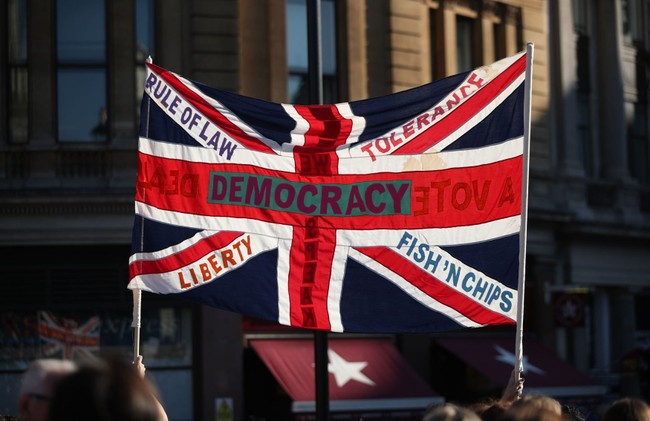
At this point in history, examples of the 21st-century UK mirroring the version depicted in Orwell’s “1984” have become so ubiquitous that they are barely worth mentioning. Barring a sea change in British politics, the transformation into Airstrip One is only a matter of time.
Ostensibly, the UK’s Online Safety Act is designed to protect children from harmful and illegal content. According to the act, the “17 Kinds of Illegal Content” are:
- 1. Terrorism
- 2. Child Sexual Exploitation and Abuse (CSEA)
- a. Grooming
- b. Image-based Child Sexual Abuse Material (CSAM)
- c. CSAM URLs
- 3. Hate
- 4. Harassment, stalking, threats, and abuse
- 5. Controlling or coercive behaviour
- 6. Intimate image abuse
- 7. Extreme pornography
- 8. Sexual exploitation of adults
- 9. Human trafficking
- 10. Unlawful immigration
- 11. Fraud and financial offences
- 12. Proceeds of crime
- 13. Drugs and psychoactive substances
- 14. Firearms, knives, and other weapons
- 15. Encouraging or assisting suicide
- 16. Foreign interference
- 17. Animal cruelty
Most, if not all, civilized people would agree that the majority of the things enumerated above have no place anywhere in society, let alone online. I think we can all get on board with the idea that CSAM, animal cruelty, self-harm advocacy, etc., are evil.
But suppose a Briton is concerned about the influx of illegal immigrants, the situation in Epping, or the rape/grooming gangs? Suppose our Briton in question takes to social media to learn more, voice their opinion, or tell their story? Suppose someone wants to discuss the prevalence of weapons or the dangers of human trafficking? What if someone wants to warn others about rape gangs that might be in the area? What kind of response might that trigger?
Breitbart notes that after the law took effect last Friday, people in the UK visiting X saw this message: “Due to local laws, we are temporarily restricting access to this content until X estimates your age.” The users were trying to find footage of anti-immigration protests that sprang up after an Ethiopian migrant living at an Epping hotel sexually assaulted a 14-year-old girl.
If you have a standard X account in the UK – presumably the vast majority of British users – you cannot see any protest footage that contains any violence tonight. Because of the Online Safety Act.
A relative in America sent me this screenshot of one blocked post pic.twitter.com/dYBq2RzOIB
— Benjamin Jones (@BenBarryJones) July 25, 2025
So instead of having the police show up at their homes and possibly landing in the clink for posting unapproved content, UK citizens may soon not be able to post anything at all.
Yes, yes, yes, you say. That’s all par for the course for the UK. True, and it has been par for the course for some time in the U.S. The National Pulse is claiming that at least one member of Congress could get behind the idea. During a junket to the UK, which involved a heated exchange with Nigel Farage, Jamie Raskin (D-Md.) commented:
We thought there were some very good things in the Online Safety Act, and there might be some problematic things. I think the intervention of Democrats who don’t have a dog in that fight was maybe too much for [Nigel Farage] to handle, but we did want to make some general points about the freedom of speech.
The Pulse added:
For his part, Raskin defended his own outburst by dismissing Farage’s valid concerns regarding his own experience being the target of politically motivated censorship, such as debanking, by stating the incident was an “explosive reaction of one British politician who obviously didn’t want any challenge to his view that he’s a free speech victim.”
The piece did not elaborate on what Raskin found appealing or unappealing about the new law. However, it bears repeating that Raskin’s party is the one that told us that Russiagate was real and Hunter’s laptop was not. It is the same group that told us that Trump praised white supremacists when he did not, and that CBP agents on horseback were whipping Haitian migrants when nothing of the kind occurred. So it should come as no surprise that his interest was piqued.
There is nothing wrong with disliking a sitting president or the opposition party and being vocal about the reasons. That’s healthy in a republic, and I would argue it is a necessary component of freedom. There is something terribly wrong with dishonesty and obfuscation. As someone who was sexually exploited as a minor, I will say that such material should be blocked, and the punishment of the purveyors should be taken from the pages of Dante’s “Inferno.” And while X (currently known as “The Sydney Sweeney Network”) is still a chemical weapons dump for rage and clickbait, using safety as a way to suppress news and thoughts that any government does not like is a different matter entirely.
That was the wind-up; here’s the pitch: as long as we’re talking about free speech, we’d love for you to join us in the fight. For just a few pennies a day, you can become a VIP member with all the rights and privileges pertaining thereto. Just click here to get the ball rolling and use promo code FIGHT for 60% off.

















